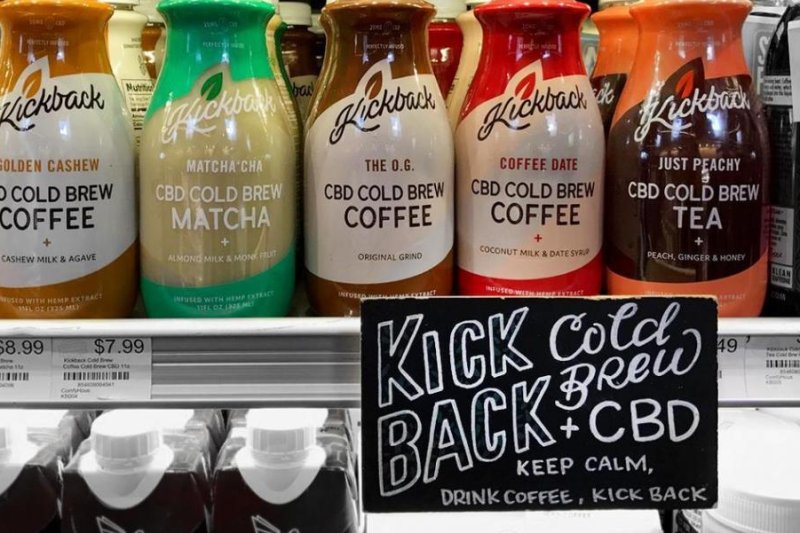A grocery in Los Angles displays cold brew coffee and tea infused with CBD. The FDA still prohibits adding CBD to food products, although many have flooded the market. Photo by Deceptitom/Wikimedia Commons
DENVER, Aug. 16 (UPI) -- A roomful of natural products professionals and cannabidiol entrepreneurs heard the bad news in Denver on Friday from a government spokeswoman: The U.S. Food and Drug Administration still considers CBD a prohibited substance in any food or dietary supplement for humans or animals.
In a city that sells CBD-infused beer, kambucha and dog treats, Cara Welch, a senior adviser in the FDA's Center for Food Safety and Applied Nutrition, told attendees at an American Herbal Products Association conference that the FDA also was concerned about unsubstantiated health claims that CBD cured everything from Alzheimer's disease to cancer.
"It is prohibited to add CBD to food," Welch said. "There is still a significant amount of missing data to better understand the effects on human exposure and the long-term effects of regular consumption," Welch said.
Some studies show some toxic effects on the liver in high doses, and there is inadequate research about the use of CBD by pregnant or nursing mothers or people with low immunity, she said.
The FDA has approved CBD as an ingredient in four drugs that have gone through the agency's review process. Three are appetite-enhancing and anti-nausea medications for patients with cancer or HIV: Marinol, Syndros and Cesamet. The other drug is Epidiolex, an anti-seizure drug.
In May, the FDA held a public hearing and received almost 4,500 comments on CBD. The agency has formed a hemp working group that is looking at regulatory pathways to move forward on the rules for CBD, Welch said, but there is still not enough data to make a determination.
The agency's role in regulating CBD is "like every other product" in which the FDA's mission is to regulate "fraudulent products" and ensure the integrity of the food supply, she said.
The agency issued warning letters for several companies falsely marketing CBD as having therapeutic properties for Alzheimer's disease, cancer and pain, Welch noted.
More letters were not immediately forthcoming because of the agency's "limited resources," she said.
Rules not yet finalized
The U.S. Department of Agriculture's hemp chief also attended the conference, as was Colorado Gov. Jared Polis.
The USDA's Bill Richmond said the agency had not yet completed the agency's final rules promised to update the 2018 Farm Bill passed in January.
Meanwhile, hemp and CBD industry professionals marketing everything from gummies to hand cream, tinctures, oils and cosmetics asked for industry standards for the substance.
"Hemp is just another herb that should be regulated the same as any other dietary supplement," said Michael McGuffin, president of the American Herbal Products Association. He compared CBD to herb-derived products like acinacea and said CBD producers should be expected to comply with "all federal regulations" including using registered food and processing facilities.
Tracy Miedema of Corvalis, Ore., a hemp investor and "true believer" who was married in a hemp wedding dress in the 1990s, said CBD was a huge phenomenon worldwide. The market is expected to generate between $15 billion and $20 billion in sales in the next few years, according to several studies.
"When the 2018 Farm Bill passed, taking CBD off the Schedule 1 [drug list], that unlocked the potential in funding," said Miedema, who is a board member on the Lexington, Ky.-based U.S. Hemp Roundtable.
"This is a political problem, not a legal problem," Miedema said. "Neither demand nor supply can be stopped at this point. CBD is too big to fail."















